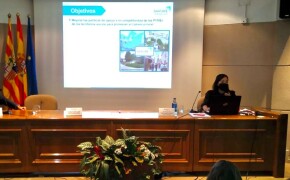To make easier the survival of rural retail in depopulated areas in the Province of Teruel through the creation of complementary services and municipal support.
It is a business activity that provides basic services to the population in places where there are not or are going to disappear activities so useful like shops.
The main objective is to improve rural retail activity with complementary services:
-Shop of basic consumer goods.
-Coffee, restaurant and leisure, as meeting place.
-Turistic as information desk.
-Accommodation.
-Internet (WiFi), hairdresser, handicraft, library, post office, medicines...
-Additional services (home delivery, thematic parties, play center...)
The problem addressed and the context are:
o Low feasibility of the private initiatives in depopulated territories
o Depopulation
o Ageing of the population
o Lack of services
o Low training of the entrepreneurs
o Low knowledge of the reality of rural environment
Since 2003 this project has been consolidated thanks to the cooperation of the Official Chamber of Commerce, Industry and Services of Teruel with the provincial and regional administrations, giving a specific line of grants to this model through its local Governments that decide to open and equip a MultiService center. The brand is registered by ©CámaraTeruel since 2010 and the main tasks of the Chamber is monitoring of Multiservices’ network, viability analysis, promotion and dissemination of this kind of centers, training to entrepreneurs and awareness-raising about local consumption.
The actors involved are the city councils, entities, entrepreneurs and the population.
Resources needed
-Human resources: Own staff of the Chamber of Commerce.
-Financial resources: About 23,500€/year in the Region of Aragón, through an annual collaboration agreement: 80% financed by Regional Government of Aragón and the 20% financed by Aragon’s Official Chambers of Commerce (Huesca,Zaragoza,Teruel)
Evidence of success
75 Rural MultiService (RMS) establishments in the Province of Teruel, 18 RMS in the Province of Huesca and 20 RMS in the Province of Zaragoza so more than 100 entrepreneurs= jobs, mainly female, because each RMS centre is managed by, at least, one self-employed (people who want to become entrepreneur).
Keep the population and the quality of life.
In some cases, stay opened the school.
Difficulties encountered
To improve the services and the attraction of rural life, promote rural’s pride and its quality of life.
Establishment of population and potential entrepreneurs.
Potential for learning or transfer
Key success factors:
-Cooperation Public-Private: the owner of the RMS centres are the local Governments and they equip part of the establishments (furniture, painting...) thanks to an annual subsidy of the Administrations of the Region and the Provinces. When the RMS centre is conditioned the local government looks for people who want to become entrepreneur. The person chosen has to cover the monthly costs of light , social security... as any other private initiative.
-Accompanying and personal advising: The Chamber of Commerce offers assistance to all these centres.
-Economic support from Local and Regional Government: annual subsidy to launch the RMS centres.
-Training and specialisation technique: The Chamber of Commerce gives training to the entrepreneurs who manage these centres.
Please login to see the expert opinion of this good practice.
Tags: SME, Competitiveness, Sustainable, Project








